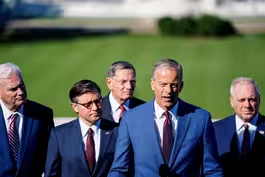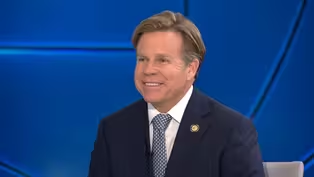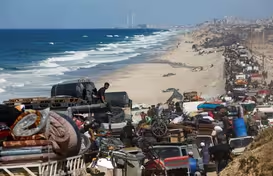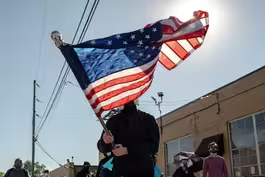
How a strike, immigrant labor transformed Hormel’s hometown
Clip: 10/1/2025 | 8m 50sVideo has Closed Captions
How a bitter strike and immigrant labor transformed Hormel’s hometown
No single industry in the American economy relies more on immigrant labor than livestock and meat production. The shift began a half-century ago as the influence of labor unions, and wages, declined. Fred de Sam Lazaro reports on how this change has played out in one Minnesota community that witnessed a landmark strike 40 years ago.
Problems playing video? | Closed Captioning Feedback
Problems playing video? | Closed Captioning Feedback
Major corporate funding for the PBS News Hour is provided by BDO, BNSF, Consumer Cellular, American Cruise Lines, and Raymond James. Funding for the PBS NewsHour Weekend is provided by...

How a strike, immigrant labor transformed Hormel’s hometown
Clip: 10/1/2025 | 8m 50sVideo has Closed Captions
No single industry in the American economy relies more on immigrant labor than livestock and meat production. The shift began a half-century ago as the influence of labor unions, and wages, declined. Fred de Sam Lazaro reports on how this change has played out in one Minnesota community that witnessed a landmark strike 40 years ago.
Problems playing video? | Closed Captioning Feedback
How to Watch PBS News Hour
PBS News Hour is available to stream on pbs.org and the free PBS App, available on iPhone, Apple TV, Android TV, Android smartphones, Amazon Fire TV, Amazon Fire Tablet, Roku, Samsung Smart TV, and Vizio.
Providing Support for PBS.org
Learn Moreabout PBS online sponsorshipAMNA NAWAZ: Well, no single industry in the American economy relies more on immigrant labor than livestock and meat production.
The shift began a half-century ago as the influence of labor unions and wages declined.
Fred de Sam Lazaro reports on how this change has played out in one Minnesota community that witnessed a landmark strike 40 years ago.
FRED DE SAM LAZARO: Austin, Minnesota, has all the postcard touches of small-town America, ringing church bells, quiet streets and weeknight football practice under the big water tower.
But it's in an adjacent football field where the Norman Rockwell imagery meets the 21st century.
They're playing soccer on it, or football, as it's likely known in the many native languages of these high school players.
The demographic transformation of this community of 26,000 over barely a generation has been driven, like much of its history, by Hormel, known for its bacon, ham and, most famously, spam.
There is even a Spam Museum downtown.
PETER RACHLEFF, Labor Historian: You had a company that had been in this community for 70, 80 years, had prospered, and then, suddenly in 1977, the company announced that their plant was hopelessly outmoded.
FRED DE SAM LAZARO: Labor historian Peter Rachleff says Hormel, citing competitive pressures, sought and won tax breaks from the city and a wage freeze from the union in exchange for modernizing its plant and keeping it in Austin.
PETER RACHLEFF: And, in 1984, that seven-year wage freeze expired and the union sat down with the company, expecting that wages were going to go up.
And the company came to the bargaining table and said that they wanted a 23 percent wage cut.
And, at that point, all hell broke loose.
(CHANTING) FRED DE SAM LAZARO: After months of agitation, 1,500 workers at the Austin plant walked off the job.
Tensions escalated into the bitter winter, and National Guard troops were called in to keep the peace, especially when the plant reopened on the company's terms with replacement workers and about 500 strikers who crossed the picket line.
More than 1,000 who didn't lost their jobs.
MAN: I'd like to ask you to make this mass a special mass for prayers for all the community of Austin.
FRED DE SAM LAZARO: The strike divided church congregations, fraternal groups, and even families.
RONALD BERGSTROM, Former Hormel Worker: It really hurts.
FRED DE SAM LAZARO: Unlike his brother, Ronald Bergstrom returned to the plant.
RONALD BERGSTROM: He took his position.
I took mine.
And since before Christmas, we haven't talked.
R.J.
BERGSTROM, Former Hormel Worker: My mom called me the other day and she said: "Why don't you go on and get your job back?"
And I said: "Well, one scab in a family's enough."
FRED DE SAM LAZARO: We reached out to the Bergstrom brothers.
They are now reconciled after years of being estranged.
But they, like many others from that time from both sides of the picket line, did not wish to revive painful memories.
For its part, the Hormel company also declined to participate, saying it had moved on from the strike.
RAYCE HARDY, Teacher: There's a lot of people living here that didn't grow up here.
FRED DE SAM LAZARO: Rayce Hardy grew up here and, as a teacher, he's seen the demographic shift up close.
RAYCE HARDY: I graduated in 1982.
FRED DE SAM LAZARO: How many of your contemporaries are still in town?
RAYCE HARDY: I would say 20 percent.
And now Austin is a majority-minority school district, so people who identify as Caucasian are the minority.
And at the time of the strike, it was 98 percent.
FRED DE SAM LAZARO: Rayce's father, William Hardy, spent 46 years at the Hormel plant starting right after high school.
RAYCE HARDY: And when I was growing up, he worked in rendering.
FRED DE SAM LAZARO: So, rendering means essentially cleaning out the guts of... RAYCE HARDY: So it's all the stuff that we're not going to eat.
FRED DE SAM LAZARO: The job did support a solid middle-class lifestyle for the Hardy family, one that encouraged higher education and, from his father and fellow meatpackers, this advice: RAYCE HARDY: They said, don't go work in the plant.
Go get a job where it's not going to wear your body out.
FRED DE SAM LAZARO: That was the other thing.
It was hard work, right?
RAYCE HARDY: Yes, I would challenge anybody to go in and try to wield a knife at the speed and the accuracy of cutting up a pig that they do.
They're -- it's miraculous to watch.
PETER RACHLEFF: Meatpacking workers have historically been people one generation off the farm.
Today, the workers are fresh off the farm in Eritrea, in Togo.
FRED DE SAM LAZARO: Do people connect the Hormel strike with the immigration that followed it?
TOM STIEHM, Former Mayor of Austin, Minnesota: Oh, absolutely.
FRED DE SAM LAZARO: Tom Stiehm is a former mayor of Austin and police officer.
Even though some in this nearly all-white community were unhappy with so many new arrivals, the community and especially police had to take a nuanced approach to immigration enforcement, he says.
TOM STIEHM: If they committed a crime, they were gone, but we just weren't going to stop people on the street and say, OK, let's see your papers, because it was disrupting a lot of families and stuff in town.
FRED DE SAM LAZARO: It would have disrupted production at Hormel as well, right?
TOM STIEHM: Oh, sure.
We had to integrate.
It was just the future.
OBALLA OBALLA, Austin, Minnesota, City Councilmember: I was looking for a better life and a better opportunity, because I grew up in a refugee camp.
FRED DE SAM LAZARO: Oballa Oballa, originally from Ethiopia, first arrived in Maryland, but it was his mother who came to Austin for a job, invited here by a relative.
OBALLA OBALLA: She told my mom: "This town is really quiet, good place.
You will find a job.
It doesn't matter if you speak English or not."
FRED DE SAM LAZARO: What did she do at Hormel?
OBALLA OBALLA: She was working on the line in the ham boning department.
FRED DE SAM LAZARO: He barely spoke English when he arrived, but went on to get a college degree and now works as a team leader at Hormel.
So you represent something very different than what's represented on this wall.
OBALLA OBALLA: Yes.
FRED DE SAM LAZARO: And, in 2020, Oballa became the first ever nonwhite member of Austin's City Council.
He's taken pains to allay voter fears, he says, about immigrants.
OBALLA OBALLA: When I door-knock, someone will tell you: "Are you even a citizen?"
And I do have to tell people or prove myself.
We are not here to create any crime.
The good thing, the majority of Austin, they were ready for change.
FRED DE SAM LAZARO: The term majority has a different meaning, perhaps no meaning at all, in Austin schools, whose pupils represent 46 different language backgrounds, from Myanmar to Micronesia.
KRISTI BECKMAN, Equity Coordinator, Austin Public Schools: We have a team of 16 multilingual, multicultural success coaches who speak 12 languages.
FRED DE SAM LAZARO: Kristi Beckman and colleague Corey Haugen work to help immigrant students and their families adapt, a task that's become that much more complicated amid fears in recent months of immigration crackdowns.
COREY HAUGEN, Director of Information Services, Austin Public Schools: Our focus is the kids first and foremost every single day, so it's certainly on the back of our minds because we want our students to be in school.
We want them to be safe.
KRISTI BECKMAN: So if they come to school with fears about their own safety or their parents' safety, it can be really difficult for them to focus on learning.
RAYCE HARDY: Well, I have nervous students, really nervous spring semester, and I have nervous students right now.
FRED DE SAM LAZARO: So far, there have not been any major immigration enforcement actions in Austin.
And, slowly, Rayce Hardy says, over time, a new sense of one community is emerging, beginning in the schools.
RAYCE HARDY: Sports has really helped that.
We have had successful soccer here.
FRED DE SAM LAZARO: And that wasn't a thing, I would imagine, in 1985.
RAYCE HARDY: No, we didn't even have high school soccer.
Austin didn't.
FRED DE SAM LAZARO: Amid the heated national debate about immigration in a region where President Trump remains popular, immigration has brought a nervous prosperity to Hormel and its hometown.
For the "PBS News Hour," this is Fred de Sam Lazaro in Austin, Minnesota.
Congress, White House refusing to compromise on shutdown
Video has Closed Captions
Clip: 10/1/2025 | 7m 9s | Congressional leaders and White House refuse to compromise on first day of shutdown (7m 9s)
GOP's Haridopolos says Democrats' demands are 'ransom note'
Video has Closed Captions
Clip: 10/1/2025 | 8m 35s | GOP Rep. Haridopolos says Democrats' demands are a 'ransom note' (8m 35s)
How Jane Goodall changed the way people see animals
Video has Closed Captions
Clip: 10/1/2025 | 4m 57s | Remembering Jane Goodall and how she changed the way people see animals (4m 57s)
Israel escalates Gaza City siege as Hamas reviews proposal
Video has Closed Captions
Clip: 10/1/2025 | 3m 23s | Israel escalates siege of Gaza City as Hamas reviews proposal to end war (3m 23s)
Jeffries says GOP 'apparently wanted' a shutdown
Video has Closed Captions
Clip: 10/1/2025 | 8m 24s | Jeffries says GOP uninterested in negotiating because 'they apparently wanted' a shutdown (8m 24s)
News Wrap: Supreme Court lets Lisa Cook stay in role for now
Video has Closed Captions
Clip: 10/1/2025 | 4m 52s | News Wrap: Supreme Court lets Lisa Cook stay in her role at Federal Reserve for now (4m 52s)
Poll shows change in Americans' views on political violence
Video has Closed Captions
Clip: 10/1/2025 | 5m 7s | New poll shows striking change in Americans' views on political violence (5m 7s)
Providing Support for PBS.org
Learn Moreabout PBS online sponsorship
- News and Public Affairs

FRONTLINE is investigative journalism that questions, explains and changes our world.

- News and Public Affairs

Amanpour and Company features conversations with leaders and decision makers.












Support for PBS provided by:
Major corporate funding for the PBS News Hour is provided by BDO, BNSF, Consumer Cellular, American Cruise Lines, and Raymond James. Funding for the PBS NewsHour Weekend is provided by...






